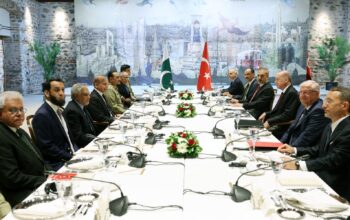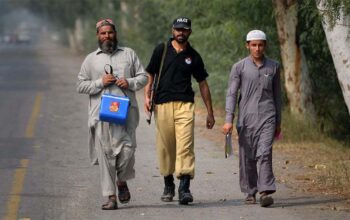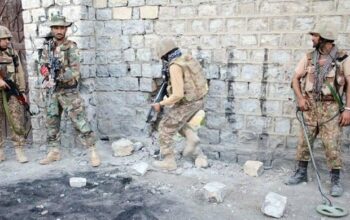By Staff Reporter
ISLAMABAD: Pakistan’s Supreme Court on Monday declared the trial of civilians arrested following violent protests in May in military courts as null and void and ordered authorities to transfer their cases to civilian criminal courts.
The decision was a rare rebuke to the country’s powerful military, which had announced that more than 100 civilians involved in attacks on key military establishments, including General Headquarters in Rawalpindi and the Corps Commander’s House in Lahore, during the protests erupted after a brief arrest of former prime minister Imran Khan, would be tried under military laws.
The decision to use military courts was taken by the previous government of Shehbaz Sharif, who has since completed his term in August and handed over to a caretaker government that will oversee an election slated for January.
The announcement faced widespread criticism from within Pakistan and rights organizations globally because of their secretive nature and their existence alongside a functioning civilian legal system.
A five-member bench of the Supreme Court led by Justice Ijazul Ahsan, and comprising Muneeb Akhtar, Yahya Afridi, Mazahir Naqvi, and Ayesha Malik, in its short verdict ruled that the trial of any civilian if held in military court has been declared “null and void”.
The judgment likely to pit the Supreme Court against Pakistan’s powerful military.
The court ruled that civilians arrested in the wake of violent protests cannot be tried by military courts, striking down a key provision of the Army Act.
In a 4-1 majority ruling, the court declared Section 2(1)(d) of the Army Act, which elaborates on persons subject to the Act, to be in violation of the Constitution. The court also declared Section 59(4) (civil offences) to be unconstitutional.
Section 2(1)(d) of the Pakistan Army Act states that anyone accused of seducing or attempting to seduce any person subject to the Act from his duty or allegiance to government, or having committed any offence related to the defence or security of Pakistan, can be tried under the secrets act.
Section 59(4) states that such persons can be tried or otherwise dealt with under the Army Act as if the offence were an offence against the Act and were committed at a time when such person was subject to the Act.
The verdict can still be appealed before a full court by the state.
“Today the Supreme Court of Pakistan has issued a very important verdict in a very important case,” Atizaz Ahsan, a senior lawyer and one of the petitioners of the case, told reporters after the decision was announced. “The Supreme Court has proven that supremacy of the law and the constitution would be upheld.”
Ahsan said through its decision, Pakistan’s top court had sent a clear message to all institutions in the country that no one is above the law.
“We were against the trial of civilians by military courts,” he said. “We argued against it and we also struggled against it.”
Copyright © 2021 Independent Pakistan | All rights reserved




